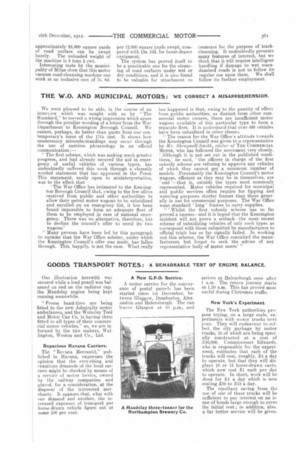THE W.O. AND MUNICIPAL MOTORS WE CORRECT A MISAPPREHENSION.
Page 5

If you've noticed an error in this article please click here to report it so we can fix it.
We were pleased to be able, in the course of an interview which was sought with us by " The Standard," to correct a wrong impression evi•iich arose through the peculiar wording of a letter from the War Department to Kensington Borough Council. We cannot, perhaps, do better than quote from our eon• temporary's issue of the 17th inst. It shows how unnecessary misunderstandings may occur through the use of careless, phraseology in an official communication :— "The first scheme, which was making much greater progress, and had already secured the aid in emergency of useful vehicles of various types, has undoubtedly suffered this week through a clumsily worded statement that has appeared in the Press. This statement, easily open to misinterpretation, was to the effect that TheWar Office. has intimated to the Kensing ton Borough Council that, (-wing to the few offers received from public and other authorities to allow their petrol motor wagons to be subsidized and enrolled on an emergency list, it has been found impossible to form an adequate fleet of them to he employed in case of national emergency. There was no alternative, therefore, but to decline the council's offer to enrol its two wagons!
" Many persons have been led by this paragraph to surmise that the War Office scheme, under which the Kensington Council's offer was made, has fallen through. This, happily, is not the case. What really has happened is that, owing to the paucity of offers from public authorities, as distinct from other commercial motor owners, there are insufficient motor wagons available of this particular type to form a separate fleet. It is understood that over 100 vehicles have been subsidized in other classes.
" The reason for the War Office's attitude towards the Kensington Council was given to a representative by Mr. Shrapnell-Smith., edttor of THE COMMERCIAL MOTOR, who has followed the movement very closely_ Although it is not set out in the published conditions,' he said, the officers in charge of the first subsidy scheme are refusing to approve any vehicles of which they cannot get a minimum number of models. Presumably the Kensington Council's motor wagons, efficient as they may be in themselves, are 'odd '—that is, outside the types most commonly represented. Motor vehicles required for municipal and public services often require for tipping and watering purposes shorter frames than those generally in use for commercial purposes. The War Office want standard long' frames to carry supplies.
" Whilst the first subsidy scheme has so far proved a success—and it is hoped that the Kensington incident will not prove a setback—the most recent scheme of subsidizing vehicles of only such types as correspond with those submitted by manufacturers to official trials has so far signally failed. In working out this scheme, the War Office consulted the manufacturers, but forgot to seek the advice of any representative body of motor ueers! "




















